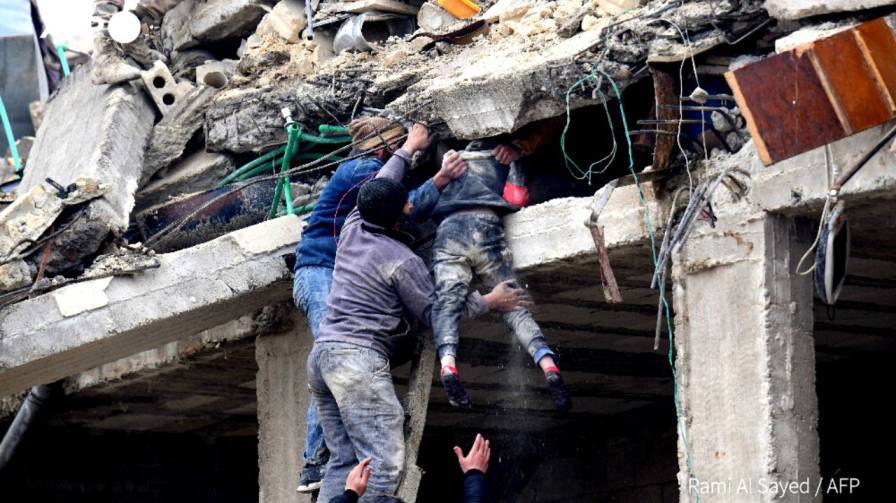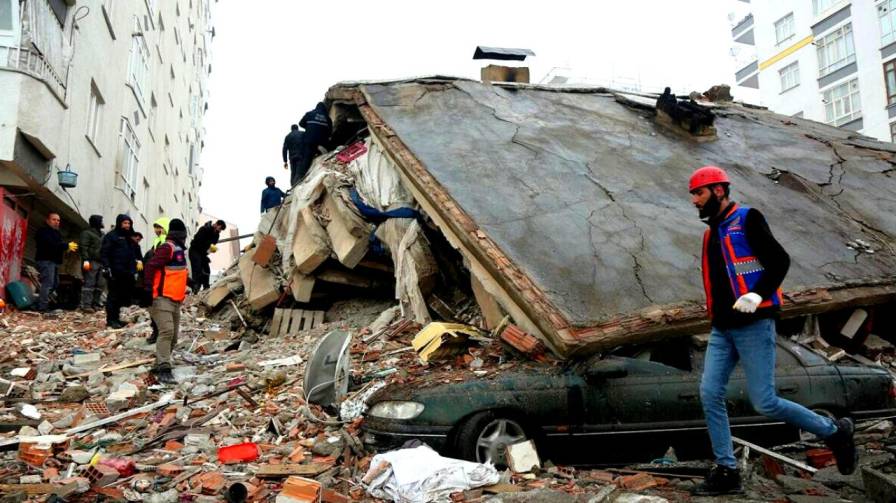7.7-magnitude earthquake strikes southern Turkey and Syria, many are trapped Erdogan sends ministers to the border.

Earthquake in turkey
More than 4,000 people have been killed in Turkey and Syria by some of the worst earthquakes to hit the Middle East in recent memory, and millions more were left without heat as night fell and snowfall accumulated.
View More: Buildings were fallen in Turkey by the powerful earthquake, which was also felt throughout in the Middle East.
According to Turkey’s disaster response management organisation, known as AFAD, an earthquake with a magnitude of 7.7 occurred early on Monday morning in the Turkish city of Gaziantep, then nine hours later another earthquake with a magnitude of 7.6 occurred nearby.
Millions will spend the night without access to power, heating fuel, or automobile petrol. As they looked for evidence of damage along a significant oil pipeline, authorities stopped the flow of petroleum to a nearby export terminal.
A 48-year-old Murat Gencogullari spoke over the phone from the border province of Hatay and stated, “We are urgently waiting for relief from neighbouring provinces but they are not coming since they’ve also been affected terribly.” He said that other nearby buildings had fallen, burying individuals under tonnes of concrete and bent metal. “”Local authorities are struggling to cope, but the destruction is so profound and devastating,”
“The strongest calamity in a century,” according to President Recep Tayyip Erdogan, is occurring in Turkey. He indicated it was hard to predict the ultimate death toll while speaking before to the second earthquake. Later, Turkey announced seven days of mourning.
According to AFAD, as of late Monday, there have been over 1,600 fatalities and more than 11,000 injuries in Turkey. According to the AP, there were around 540 fatalities in government-controlled parts of Syria. The death toll, according to groups in the rebel-held northwest, was at least 380.
According to officials who were monitoring social media for pleas for assistance from persons they suspected to be trapped under the rubble, at least four Turkish airports had suffered damage. According to Erdogan, more than 2,800 structures have fallen in Turkey.
Many of Turkey’s 3.7 million officially registered Syrian refugees, the largest such population in the world, were among the people impacted.
Despite the fact that there were no leaks found on the pipelines supplying petroleum to the plant, Turkey cut down oil supplies to the Ceyhan export terminal on the Mediterranean coast as a precaution. According to the Kurdistan Ministry of Natural Resources, oil supplies from Iraqi Kurdistan have been halted through Turkey to the terminal.
For oil sales from northern Iraq and Azerbaijan, Ceyhan is a crucial centre. In January, the port shipped more than 1 million barrels per day, or 1% of the world’s oil supplies. On Monday, the closure contributed to price increases.
Other foreign leaders, including President Joe Biden, sent their sympathies. In addition, “US-supported humanitarian partners are responding to the damage in Syria,” Biden said, adding that the US has sent teams to Turkey to assist with search and rescue efforts.
Inside visuals of Turkey Famous Hotel …#Turkey #TurkeyEarthquake #Turkiye #Turkish #TurkeyQuake #turkeyhelp #turkifsa #Turquia #Syria #syriaearthquake #Syria_earthquake #Syrian pic.twitter.com/QkRCXAYfbz
— PANKAJ KUMAR (@Headlineznow) February 6, 2023
Turkey is traversed by multiple fault lines and is located in one of the seismically active regions of the globe. Over a hundred kilometres in length, the calamity impacted multiple districts in southern Turkey where 13 million people are preparing for a severe winter. Erdogan sent numerous cabinet officials to the region as he prepares for national elections in May.
According to Turkish state pipeline firm Botas, several areas of the local gas network were damaged, halting delivery to the provinces of Kahramanmaras, Hatay, and Gaziantep.
Under the condition of anonymity, a Turkish official with firsthand knowledge of the situation stated that Turkey aims to resume gas shipments within 48 hours.

Even Egypt and Cyprus felt the initial earthquake. It was the deadliest earthquake to hit Turkey since the 33,000-person earthquake of 1939.
More than 18,000 people were murdered in tremors that struck Turkey’s industrial heartland close to the country’s main metropolis, Istanbul, in 1999. That catastrophe brought down the ruling center-left coalition at the time, opening the door for a severe financial crisis that aided Erdogan’s AK Party in winning the election. Erdogan called for assistance from 45 nations, in addition to NATO and the EU, on Monday while mobilising 9,000 first responders.
Some equities’ trading was suspended by TSE Borsa Istanbul, and the main index dropped as much as 4.5%. The Turkish lira barely moved, trading at 18.83 to the dollar.
The earthquakes damaged airports in Adiyaman, Kahramanmaras, Malatya, and Hatay, which are located in regions that account for nearly one-tenth of Turkey’s national revenue. Hatay’s port and a few hospitals also partially collapsed, according to the authorities. Roadways suffered damage.
Consequences of the #earthquake in the city of #Antakya.#Turkiye #TurkeyEarthquake #turkeyearthquake2023 #TurkeyQuake #Turkey #TurkeySyriaEarthquake pic.twitter.com/6BXcbVIiEP
— Ararat Petrosyan (@araratpetrosian) February 7, 2023
Emre Peker, Europe director for Eurasia Group, wrote in an email on Monday that “Erdogan is likely to respond firmly to reduce the economic damage of the earthquakes.” “Relief measures, including additional targeted credit-easing measures and large-scale and direct budgetary support, are expected to come next. Ahead of elections, this will also help the government’s reputation among the populace.